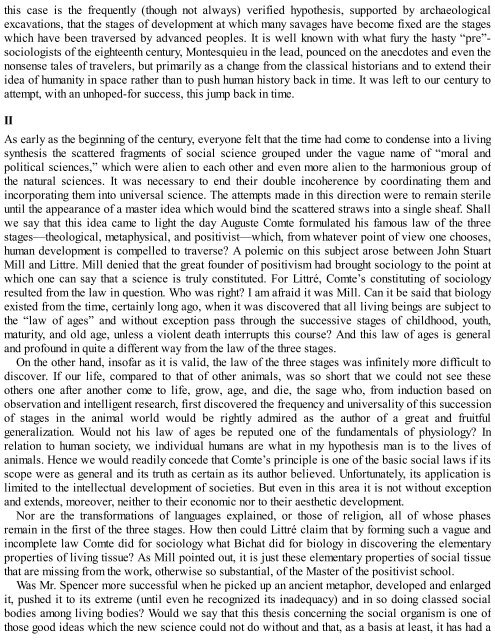3658925934
You also want an ePaper? Increase the reach of your titles
YUMPU automatically turns print PDFs into web optimized ePapers that Google loves.
this case is the frequently (though not always) verified hypothesis, supported by archaeological<br />
excavations, that the stages of development at which many savages have become fixed are the stages<br />
which have been traversed by advanced peoples. It is well known with what fury the hasty “pre”-<br />
sociologists of the eighteenth century, Montesquieu in the lead, pounced on the anecdotes and even the<br />
nonsense tales of travelers, but primarily as a change from the classical historians and to extend their<br />
idea of humanity in space rather than to push human history back in time. It was left to our century to<br />
attempt, with an unhoped-for success, this jump back in time.<br />
II<br />
As early as the beginning of the century, everyone felt that the time had come to condense into a living<br />
synthesis the scattered fragments of social science grouped under the vague name of “moral and<br />
political sciences,” which were alien to each other and even more alien to the harmonious group of<br />
the natural sciences. It was necessary to end their double incoherence by coordinating them and<br />
incorporating them into universal science. The attempts made in this direction were to remain sterile<br />
until the appearance of a master idea which would bind the scattered straws into a single sheaf. Shall<br />
we say that this idea came to light the day Auguste Comte formulated his famous law of the three<br />
stages—theological, metaphysical, and positivist—which, from whatever point of view one chooses,<br />
human development is compelled to traverse? A polemic on this subject arose between John Stuart<br />
Mill and Littre. Mill denied that the great founder of positivism had brought sociology to the point at<br />
which one can say that a science is truly constituted. For Littré, Comte’s constituting of sociology<br />
resulted from the law in question. Who was right? I am afraid it was Mill. Can it be said that biology<br />
existed from the time, certainly long ago, when it was discovered that all living beings are subject to<br />
the “law of ages” and without exception pass through the successive stages of childhood, youth,<br />
maturity, and old age, unless a violent death interrupts this course? And this law of ages is general<br />
and profound in quite a different way from the law of the three stages.<br />
On the other hand, insofar as it is valid, the law of the three stages was infinitely more difficult to<br />
discover. If our life, compared to that of other animals, was so short that we could not see these<br />
others one after another come to life, grow, age, and die, the sage who, from induction based on<br />
observation and intelligent research, first discovered the frequency and universality of this succession<br />
of stages in the animal world would be rightly admired as the author of a great and fruitful<br />
generalization. Would not his law of ages be reputed one of the fundamentals of physiology? In<br />
relation to human society, we individual humans are what in my hypothesis man is to the lives of<br />
animals. Hence we would readily concede that Comte’s principle is one of the basic social laws if its<br />
scope were as general and its truth as certain as its author believed. Unfortunately, its application is<br />
limited to the intellectual development of societies. But even in this area it is not without exception<br />
and extends, moreover, neither to their economic nor to their aesthetic development.<br />
Nor are the transformations of languages explained, or those of religion, all of whose phases<br />
remain in the first of the three stages. How then could Littré claim that by forming such a vague and<br />
incomplete law Comte did for sociology what Bichat did for biology in discovering the elementary<br />
properties of living tissue? As Mill pointed out, it is just these elementary properties of social tissue<br />
that are missing from the work, otherwise so substantial, of the Master of the positivist school.<br />
Was Mr. Spencer more successful when he picked up an ancient metaphor, developed and enlarged<br />
it, pushed it to its extreme (until even he recognized its inadequacy) and in so doing classed social<br />
bodies among living bodies? Would we say that this thesis concerning the social organism is one of<br />
those good ideas which the new science could not do without and that, as a basis at least, it has had a









![Genki - An Integrated Course in Elementary Japanese II [Second Edition] (2011), WITH PDF BOOKMARKS!](https://img.yumpu.com/58322134/1/180x260/genki-an-integrated-course-in-elementary-japanese-ii-second-edition-2011-with-pdf-bookmarks.jpg?quality=85)
![Genki - An Integrated Course in Elementary Japanese I [Second Edition] (2011), WITH PDF BOOKMARKS!](https://img.yumpu.com/58322120/1/182x260/genki-an-integrated-course-in-elementary-japanese-i-second-edition-2011-with-pdf-bookmarks.jpg?quality=85)





